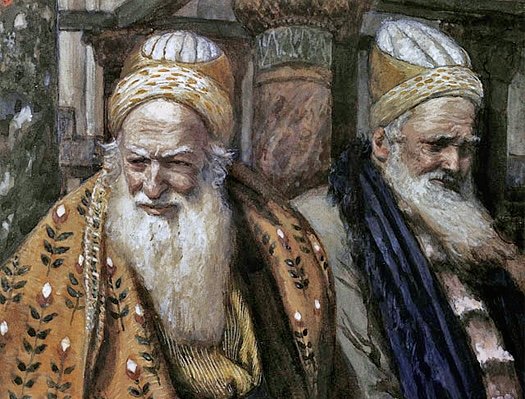
Today I'd like to share another devotional thought. First, let's set the stage:
Jacob has been living with the family of his father-in-law, Laban, for two decades. He’s married both of Laban’s daughters, and been put in charge of all of Laban’s flocks. Jacob and Laban have a deal: Jacob will receive a portion of Laban’s flocks as his wages, based on the colouring of the sheep. That way, there is no way that Jacob can be thought to be dishonest. The sheep will essentially be branded by their own colouring.
God blesses Jacob and expands the flock according to the colouring of sheep he's been assigned (e.g., streaked sheep). Seeing this, Laban commandeers Jacob's sheep for himself and assigns his son-in-law a different colouring of sheep (e.g., speckled sheep) for his wages. God continues to bless Jacob and expands the flock according to Jacob's newly-assigned sheep colouring. This happens ten times (e.g., next moving to spotted sheep, and so on).
Now let's pick up the story in Genesis 31:
Laban's sons have become jealous of Jacob, accusing him in their hearts of stealing their father's wealth, though he has been scrupulously honest. Laban's attitudes towards his son-in-law have also shifted towards resentment.
In response, God tells Jacob, “Go back to the land of your fathers and to your relatives, and I will be with you.” [1]
Jacob calls his wives to a secret meeting where he reviews his history with their father, his righteousness, God's blessing, and his father-in-law's persistent deceitfulness and resentment. He also shares with them God's instruction to return to his homeland.
Rachel and Leah reply, “Do we still have any share in the inheritance of our father’s estate? Does he not regard us as foreigners? Not only has he sold us, but he has used up what was paid for us. Surely all the wealth that God took away from our father belongs to us and our children. So do whatever God has told you.” [2]
Jacob secretly leaves Laban's household with his wives, children, and livestock, and sets out for the land of his father—in Canaan.
Three days later, Laban discovers that Jacob has fled. He gathers a mob and pursues his son-in-law and daughters. The night before Laban catches up with them, God speaks to him in a special dream. He says, “Be careful not to say anything to Jacob, either good or bad.” [3]
When Laban overtakes Jacob, he chides him for the manner of his departure. "You've tricked me! You've 'carried off my daughters like captives in war.' [4] I would have thrown you a goodbye party. Why did you do this? Why didn't you let me kiss my daughters and grandchildren goodbye?"
"You have done a foolish thing," Laban continues. "I have the power to harm you; but last night the God of your father said to me, ‘Be careful not to say anything to Jacob, either good or bad.’” [5]
Jacob responds, “I was afraid, because I thought you would take your daughters away from me by force." [6]
Jacob goes on to review his history with Laban: “I have been with you for twenty years now. Your sheep and goats have not miscarried, nor have I eaten rams from your flocks. I did not bring you animals torn by wild beasts; I bore the loss myself. And you demanded payment from me for whatever was stolen by day or night. This was my situation: The heat consumed me in the daytime and the cold at night, and sleep fled from my eyes. It was like this for the twenty years I was in your household. I worked for you fourteen years for your two daughters and six years for your flocks, and you changed my wages ten times. If the God of my father, the God of Abraham and the Fear of Isaac, had not been with me, you would surely have sent me away empty-handed. But God has seen my hardship and the toil of my hands, and last night he rebuked you.” [7]
Laban answers, “The women are my daughters, the children are my children, and the flocks are my flocks. All you see is mine. Yet what can I do today about these daughters of mine, or about the children they have borne? Come now, let’s make a covenant, you and I, and let it serve as a witness between us.” [8]
The two men make a covenant with each other. The following day, Laban blesses his daughters and grandchildren, and returns home in peace.
—Genesis 31:1–55
Laban was a crafty fellow. This is the man who promised one of his daughters (Rachel) to Jacob in return for seven years of work, and then switched her out for the older, less-attractive one (Leah) on his wedding night, when Jacob was so drunk he couldn't tell the difference between the sisters. [9] This is the man who demanded another seven years of work from Jacob before he would give him the wife that he had originally promised (Rachel). This is the man who, when Jacob came to stay with him, put him to work immediately without paying him for the first month of labour rather than showing hospitality [10]— and hospitality was a prized virtue in his culture. This is the man who consistently manipulated people and situations to his own advantage.
I don't believe that Jacob's fear for his family—that Laban might take his wives and children from him by force (the ultimate theft)—was unfounded. Based on everything that we know about Laban's character, the man was entirely untrustworthy, and even cruel.
Jacob was no saint either. He had already tricked/cheated his brother, Esau, not only out of his birthright but also his blessing: something usually sacrosanct between the firstborn son and his father. [11]
But if you ever wondered where Jacob got his cunning and cheating nature, we need look no further than his mother, Rebecca, and her brother Laban. It would seem that cunning and cheating were a family trait. During the 20 years he spent in Laban's household, Jacob finally got a taste of his own medicine.
But now God has told Jacob to leave. When he employs stealth to do so, Laban chases him, catches up to him, and rebukes him.
"How could I destroy my own daughters?" Laban exclaims in dismay— even though that's exactly what he would have done if God hadn't intervened.
In a rare show of solidarity, Rachel and Leah had fully supported Jacob's decision to leave their father's house. In their own words, they acknowledged, "We are like foreigners to him." [12] Once they had brought him their dowries, Laban had no further use for them. Rather, Laban's "dismayed" exclamation at not having said goodbye was a face-saving gesture, common in cultures that largely use indirect communication. It had no basis in fact.
It occurs to me that Laban was like a "little Pharaoh," using Jacob almost as slave labour. After I first thought of this, I had to pause to think it through. Was it an overstatement? Or, was there something really there? It's noteworthy that:
- Laban required any animals stolen or torn by wild beasts to be taken out of Jacob's pay [13]
- Laban unilaterally changed Jacob's wages 10 times
- Laban tricked Jacob and changed the terms for marriage between Jacob and Rachel
- Laban put Jacob to work without a period of hospitality when he first came
- The word that Jacob used when he said, "I worked for you" to Laban is the Hebrew word abad. It can also be translated "slaved," "was in bondage," or "was enslaved" as well as "worked" or "served." [14] In fact, it's the same word used multiple times in Exodus to describe the Israelites' slavery to Egypt! [15]
The parallels between Laban and the later story of the Egyptian Pharaoh are uncanny.
- Laban used Jacob to serve him under harsh conditions for years.
- Jacob became rich by receiving Laban's belongings before fleeing from him.
- Laban chased Jacob and caught up to him.
- Jacob would have been destroyed were it not for God's intervention.
The difference? Laban's heart wasn't so hard that he wouldn't listen to God's warning. That little-bit-softer heart saved not only Jacob but Laban himself. Unlike Pharaoh, Laban wasn't destroyed in his pursuit of Israel. [16]
How crucial it is for us to have soft hearts towards God. If we harden our hearts, there may come a point when God hardens our hearts for us. But if we allow Him to speak to us, if we truly listen to his voice—even if we have sinned greatly in the past—God is willing and ready to show us mercy.
NOTES
[1] Genesis 31:3.
[2] Genesis 31:14–16.
[3] Genesis 31:24.
[4] Genesis 31:26.
[5] Genesis 31:28–29.
[6] Genesis 31:31.
[7] Genesis 31:38–42.
[8] Genesis 31:43–44.
[9] See Genesis 29:21–25.
[10] See Genesis 29:13–15.
[11] See Genesis 27:1–40.
[12] See Genesis 31:15.
[13] Though Jacob complains about this, when I dug deeper, I found that this practice was not unusual for the cultures of this area. The Code of Hammurapi states, "if he [the shepherd] has lost [the ox] or sheep which was committed to him, he shall make good ox for [ox], sheep for [sheep] to their owner." (See New International Commentary on the Old Testament: The Book of Genesis 18–50 (Eerdmans, 2022), Genesis 31:39 entry in ebook.) Similarly, the Bible makes it clear that shepherds were required to protect their flocks against theft and wild animals (see Exodus 22:9–13 and 1 Samuel 17:34–36). It would appear, then, that Jacob is being a bit whiny about this. It may be helpful to remember that in his family of origin, Esau was the outdoorsman while Jacob was more indoorsy (see Genesis 25:27). It's possible that his time with Laban was his first real experience of shepherding, so he didn't realize what was normal. Or, maybe Jacob's statements weren't meant as a complaint at all, but rather meant to contrast his consistent upholding of the social contract with Laban's consistent breaking of it.
[14] Enhanced Strong's Dictionary (Olive Tree, 2020), h5647 entry.
[15] See Exodus 1:13, 14; 5:8; 6:5.
[16] Compare Genesis 31:55 with Exodus 14:23–28. For Jacob's renaming as Israel, see Genesis 32:22–28.










